
Lisa Grossman is the astronomy writer for Science News. Previously she was a news editor at New Scientist, where she ran the physical sciences section of the magazine for three years. Before that, she spent three years at New Scientist as a reporter, covering space, physics and astronomy. She has a degree in astronomy from Cornell University and a graduate certificate in science writing from UC Santa Cruz. Lisa was a finalist for the AGU David Perlman Award for Excellence in Science Journalism, and received the Institute of Physics/Science and Technology Facilities Council physics writing award and the AAS Solar Physics Division Popular Writing Award. She interned at Science News in 2009-2010.

Trustworthy journalism comes at a price.
Scientists and journalists share a core belief in questioning, observing and verifying to reach the truth. Science News reports on crucial research and discovery across science disciplines. We need your financial support to make it happen – every contribution makes a difference.
All Stories by Lisa Grossman
-
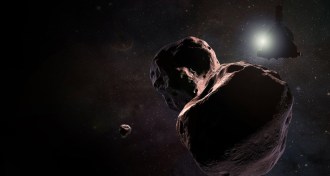 Planetary Science
Planetary ScienceNew Horizons wakes up to begin Kuiper Belt exploration
The New Horizons spacecraft just woke up to get ready for its New Year’s Day flyby of the distant space rock Ultima Thule.
-
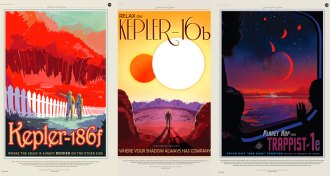 Astronomy
AstronomyTake a virtual trip to an alien world
NASA’s Exoplanet Travel Bureau website lets you view what alien landscapes might look like.
-
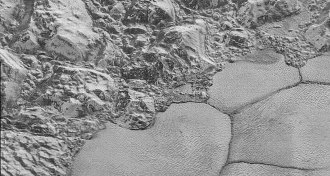 Planetary Science
Planetary ScienceNever-before-seen dunes on Pluto spotted in New Horizons images
Images from the New Horizons spacecraft reveal dunes on Pluto — but the sand-sized grains must have had an unusual boost to get moving.
-
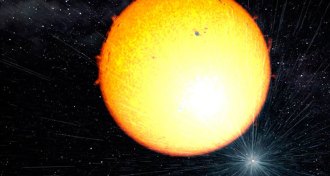 Astronomy
AstronomyTwo-faced star reveals a pulsar’s surprising bulk
An ultramassive pulsar is frying its stellar companion so that the star shows two different temperatures.
-
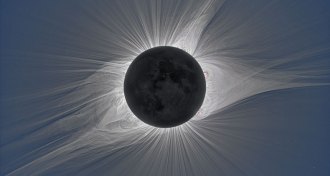 Astronomy
AstronomyAstronomers scrutinized last year’s eclipse. Here’s what they’ve learned
Astronomers observed the 2017 total solar eclipse from the ground and the air, and found some never-before-seen features of the sun’s atmosphere.
-
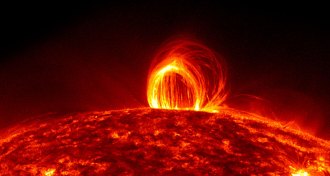 Astronomy
AstronomyPlasma rain in the sun’s atmosphere falls in surprising places
Scientists found rain in the sun’s corona where they didn’t expect it, which could help solve the mystery of why the corona is so hot.
-
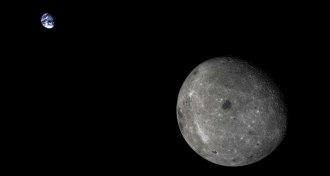 Planetary Science
Planetary ScienceChina is set to launch a satellite to support a future lunar rover
China is set to launch a satellite to support a future lunar rover that will make the first-ever visit to the farside of the moon.
-
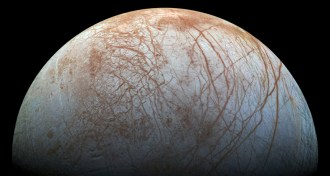 Planetary Science
Planetary ScienceAnother hint of Europa’s watery plumes found in 20-year-old Galileo data
A fresh look at old data suggests that NASA’s Galileo spacecraft may have seen a plume from Jupiter’s icy moon Europa in 1997.
-
 Astronomy
AstronomyThe recipes for solar system formation are getting a rewrite
A new understanding of exoplanets and their stars is rewriting the recipes for planet formation.
-
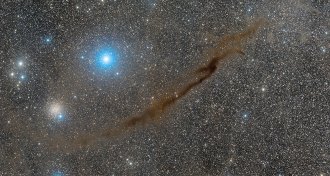 Astronomy
AstronomyFirst 3-D map of a gas cloud in space shows it’s flat like a pancake
An interstellar gas cloud dubbed the Dark Doodad Nebula looks like a wispy, thin cylinder. But it’s actually a flat sheet.
-
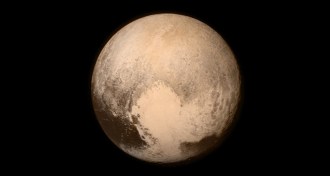 Planetary Science
Planetary ScienceGetting NASA’s Pluto mission off the ground took blood, sweat and years
Alan Stern talks about the new book ‘Chasing New Horizons’ and what’s next for the spacecraft that got close to Pluto.
-
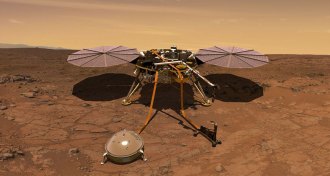 Planetary Science
Planetary ScienceNASA gets ready to launch the first lander to investigate Mars’ insides
The InSight lander is launching to Mars on May 5 and is expected to be in position to sense seismic activity by early 2019.